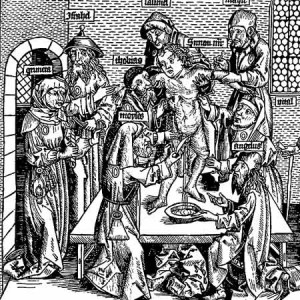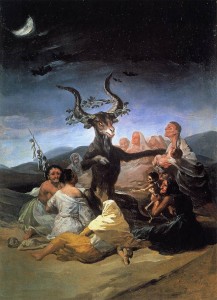I am rethinking my attitude to paranoia.
For many years, I have written on the demonization of out-groups, the way in which similar charges are deployed against marginal minorities. Seemingly, the same sort of bogus allegations surface in widely different cultures around the world. Some such groups actually existed, even if they never committed the crime charged against them (Jews in early modern Europe), while other demon figures are wholly invented (witches in the 1590s, Satanist murder gangs in the 1990s), but the accusations remain the same. Commonly, these charges involve the abduction or murder of children.
One example I use for this process concerns the charges brought against Christians in the Roman Empire, when they too were a demonized sect. Around 177, Athenagoras wrote his Legatio pro Christianis, which noted that “Three things are brought against us Christians: atheism, Thyestean feasts, and Oedipodean intercourse,” which is to say, cannibalism and incestuous orgies. Naturally, he concluded, “these things are only idle tales and empty slanders.”
I’m still sure those specific charges are utterly false, especially since they so closely echo the nightmare fantasies brought against other groups in other eras. Think of medieval portrayals of the witches’ Sabbat. (See the selection of charges assembled here).
In some cases, we can see a direct literary inheritance from charges made against early Christians to polemic that Christians themselves directed against their enemies, including heretics and Jews. The fourth century writer Epiphanius had a fertile, and indeed sickening, imagination when it came to denouncing the misdeeds of heretical sects. You can have an awful lot of smoke, and no fire behind it.
But here’s a question. While skepticism is always valuable, are we always right to reject allegations of sexual libertinism, including orgies, in the context of Christian sects?
I ask because I have been reading Clement of Alexandria, who around 200 wrote controversial works against rival sects who we would commonly call Gnostic, but who defined themselves as Christian. As I have suggested, such groups would have represented a significant part of the Christian spectrum in second century Alexandria.
What makes Clement stand apart from other heresy-hunters is that he was describing sects in his local area at a time well within living memory, and in some cases still surviving in other parts of the city. We are not dealing here with a medieval monk describing the sinister deeds of heretics or Jews whom he has never met, living on the other side of the continent, or indeed long extinct.
With that in mind, look at his discussion of marriage in Book III of his Stromata. Amusingly perhaps, the ideas he was describing were so shocking that in the classic Ante-Nicene Christian Fathers, this section appears only in Latin translation!
Clement acknowledges the diversity of opinion on the topic of marriage and sexuality. Valentinians, he says, approve of marriage, partly because their view of Creation imagines a sequence of divine male-female pairs, which human beings mirror. He accuses followers of Basilides of hypocrisy, in rejecting marriage while committing sexual sins.
He then turns to the followers of Carpocrates, who was probably from Alexandria, and taught in the first half of the second century. According to Irenaeus, Carpocrates taught that human beings contained a divine spark of life trapped within the material world ruled by the Archons. Jesus was a human being, but he became Christ when a heavenly power descended on him, and he came to liberate humanity. Once redeemed, believers claimed to be perfect, and were not subject to worldly laws or restraints. They claimed equality with the apostles, if not with Christ himself. As such:
they lead a licentious life, and, to conceal their impious doctrines, they abuse the name [of Christ], as a means of hiding their wickedness; … they declare they have in their power all things which are irreligious and impious, and are at liberty to practice them; for they maintain that things are evil or good, simply in virtue of opinion.
In fact, they argued that it was necessary to experience all things, good and evil, as part of the process by which they completed the journey of transmigration. The group sounds very much like the medieval sect of the Free Spirit, which likewise taught antinomian ideas.
Irenaeus also remarked that
Others, again, following upon Basilides and Carpocrates, have introduced promiscuous intercourse and a plurality of wives, and are indifferent about eating meats sacrificed to idols, maintaining that God does not greatly regard such matters.
We might well think that Irenaeus was using vulgar slanders against an enemy. But compare Clement:
These then are the doctrines of the excellent Carpocratians. These, so they say, and certain other enthusiasts for the same wickednesses, gather together for feasts (I would not call their meeting an Agape), men and women together. After they have sated their appetites, then they overturn the lamps and so extinguish the light that the shame of their adulterous “righteousness” is hidden, and they have intercourse where they will and with whom they will. After they have practiced community of use in this love-feast, they demand by daylight of whatever women they wish that they will be obedient to the law of Carpocrates – it would not be right to say the law of God.
In support of his claims, Clement provides a substantial quote from a book written by Epiphanes, son of Carpocrates. Epiphanes really did advocate antinomian doctrines, including community of property:
Consequently one must understand the saying ‘Thou shalt not covet’ as if the lawgiver was making a jest, to which he added the even more comic words ‘thy neighbor’s goods’. For he himself who gave the desire to sustain the race orders that it is to be suppressed, though he removes it from no other animals. And by the words ‘thy neighbor’s wife’ he says something even more ludicrous, since he forces what should be common property to be treated as a private possession.
Incidentally, Epiphanes might be recalling a doctrine found in several early alternative gospels when he wrote that “He did not make a distinction between female and male, rational and irrational, nor between anything and anything else at all.” Compare the Gospel of Thomas, 22: “When you make the two one, and when you make the inside like the outside and the outside like the inside, and the above like the below, and when you make the male and the female one and the same, so that the male not be male nor the female female.” This would tend to confirm that he belonged to the same spectrum of thought as Egypt’s contemporary Gnostics.
But to return to the alleged orgies. I would argue that in this instance, Clement was in an excellent position to know what he was talking about. His statements also gain strength from the fact that he does not make comparable claims against other groups. Suggesting occasional immorality, as he did with the Basilidians, is nowhere close. He was much more restrained than Irenaeus, leave alone a hysterical scandal-monger like Epiphanius.
Also, sexual mysticism is by no means uncommon in religious traditions, from Tantra to modern Western esoteric movements. There’s nothing ipso facto improbable about its occurrence among Gnostic sects.
In the Carpocratian instance, then, I’m prepared to believe that the sexual charges might actually be true.
If they were, that would help explain the allegations against contemporary Christians of all shades. When pagans or Jews denounced the libertinism of one sect acting in the name of Jesus, they obviously drew no distinctions between particular schools of thought. As Clement himself says, “Through them the worst calumny has become current against the Christian name.”
One final note: although scholars debate the origins of Athenagoras, who complained about anti-Christian slanders, Birger Pearson locates him in Egypt, and presumably Alexandria. Athenagoras would thus have been referring to strictly local scandals and rumors.














